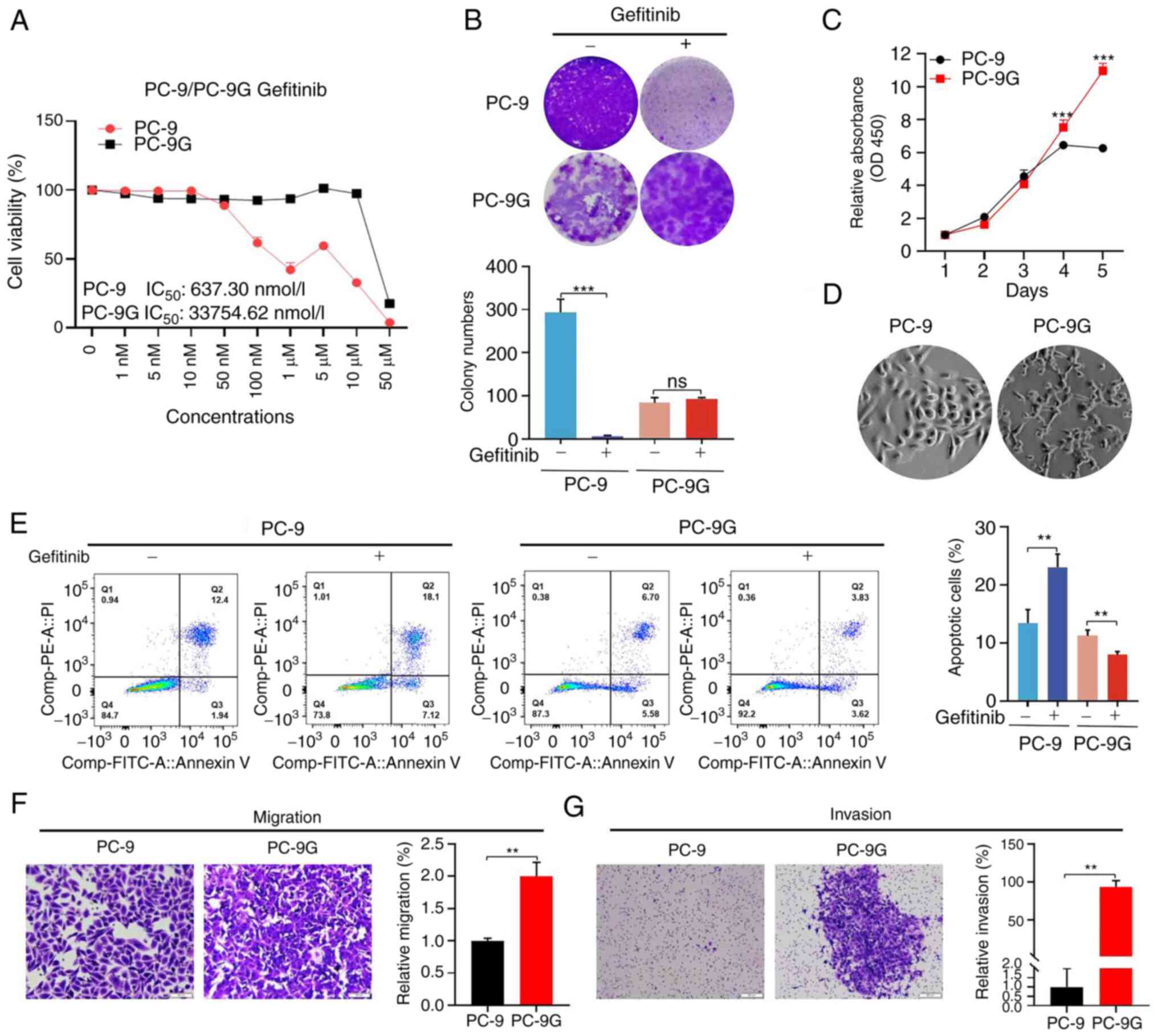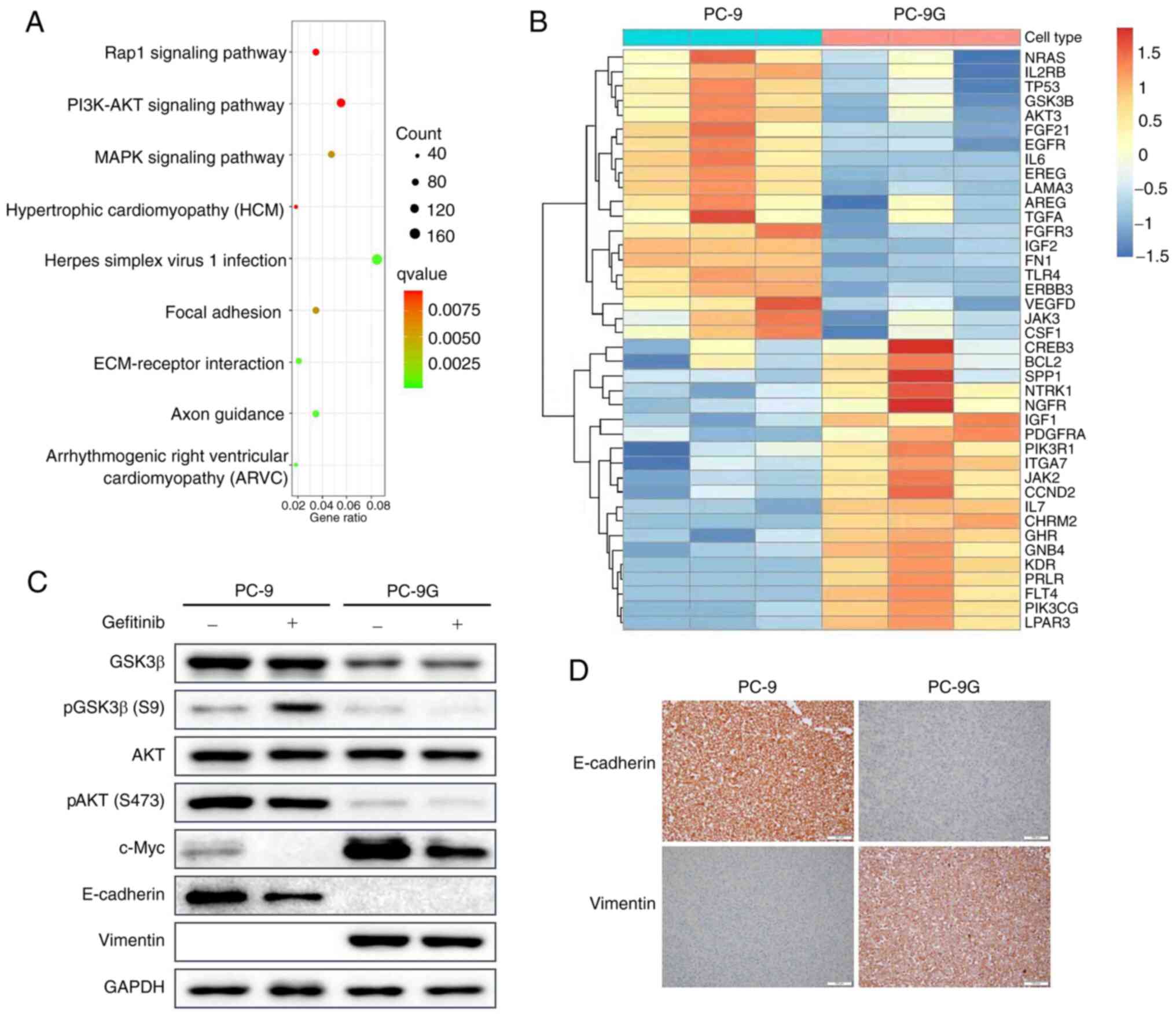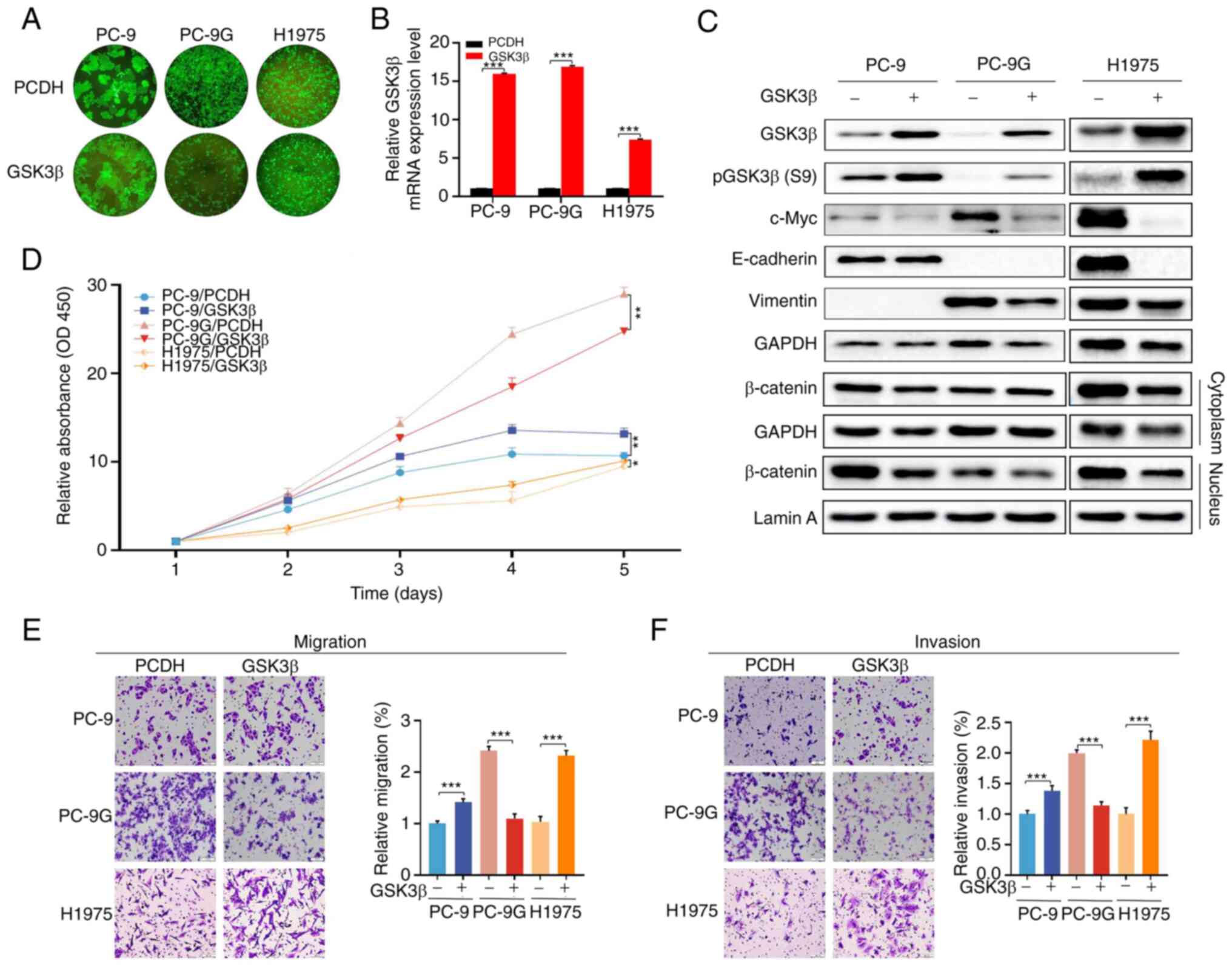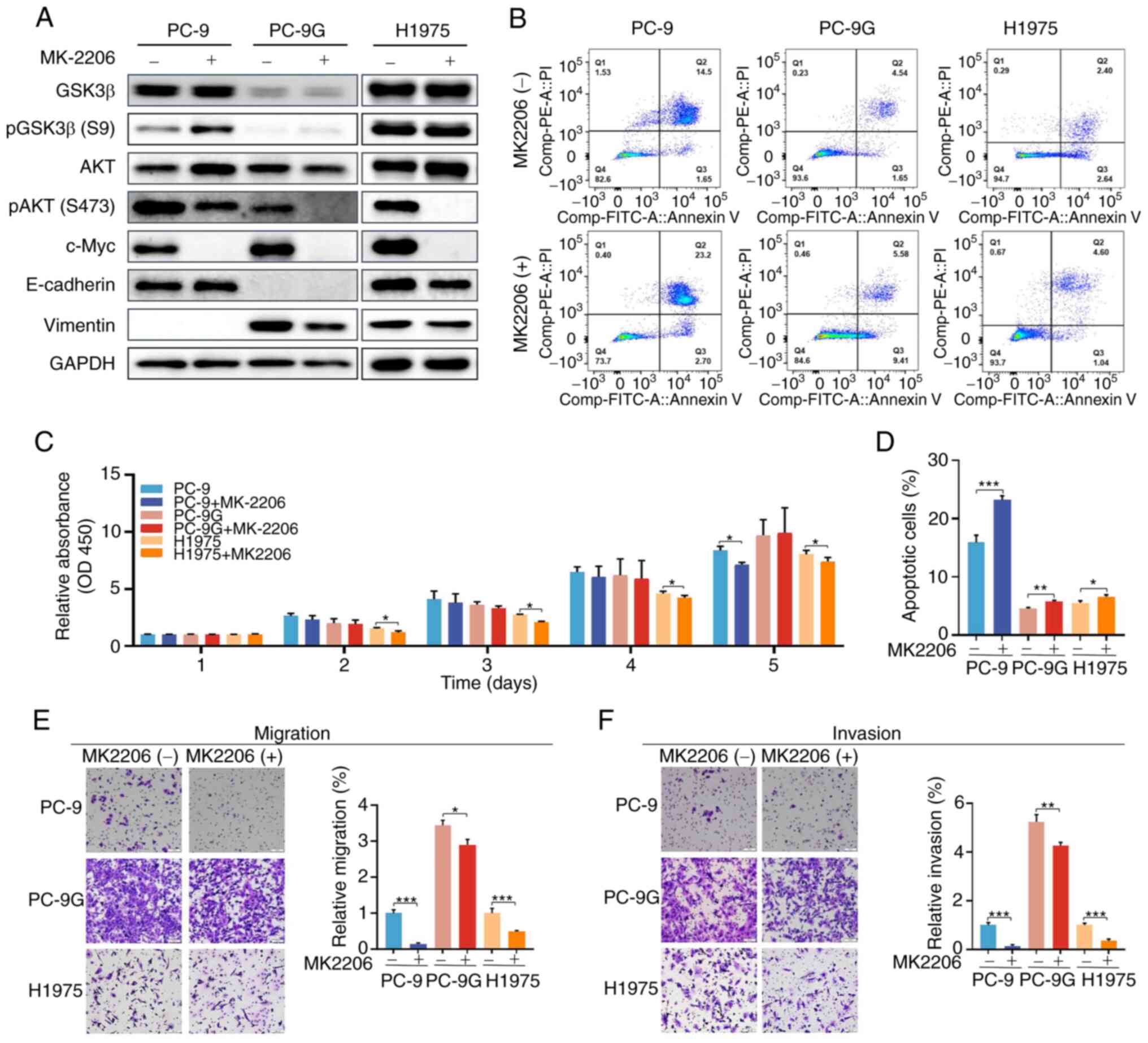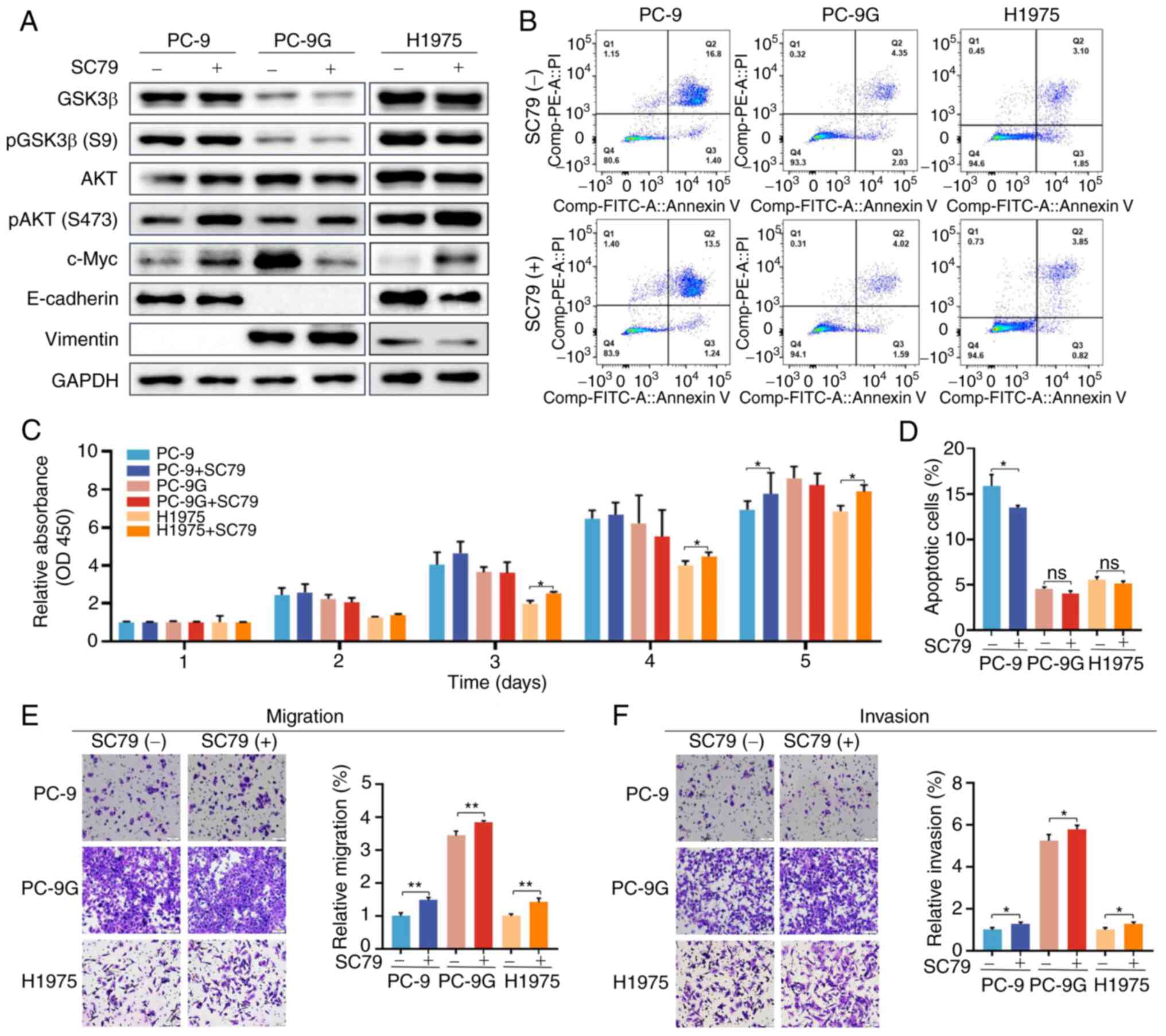|
1
|
Osmani L, Askin F, Gabrielson E and Li QK:
Current WHO guidelines and the critical role of immunohistochemical
markers in the subclassification of non-small cell lung carcinoma
(NSCLC): Moving from targeted therapy to immunotherapy. Semin
Cancer Biol. 52:103–109. 2018.PubMed/NCBI View Article : Google Scholar
|
|
2
|
Lynch TJ, Bell DW, Sordella R,
Gurubhagavatula S, Okimoto RA, Brannigan BW, Harris PL, Haserlat
SM, Supko JG, Haluska FG, et al: Activating mutations in the
epidermal growth factor receptor underlying responsiveness of
non-small-cell lung cancer to gefitinib. N Engl J Med.
350:2129–2139. 2004.PubMed/NCBI View Article : Google Scholar
|
|
3
|
Paez JG, Jänne PA, Lee JC, Tracy S,
Greulich H, Gabriel S, Herman P, Kaye FJ, Lindeman N, Boggon TJ, et
al: EGFR mutations in lung cancer: Correlation with clinical
response to gefitinib therapy. Science. 304:1497–1500.
2004.PubMed/NCBI View Article : Google Scholar
|
|
4
|
Zhou C, Wu YL, Chen G, Feng J, Liu XQ,
Wang C, Zhang S, Wang J, Zhou S, Ren S, et al: Erlotinib versus
chemotherapy as first-line treatment for patients with advanced
EGFR mutation-positive non-small-cell lung cancer (OPTIMAL,
CTONG-0802): A multicentre, open-label, randomised, phase 3 study.
Lancet Oncol. 12:735–742. 2011.PubMed/NCBI View Article : Google Scholar
|
|
5
|
Mitsudomi T, Morita S, Yatabe Y, Negoro S,
Okamoto I, Tsurutani J, Seto T, Satouchi M, Tada H, Hirashima T, et
al: Gefitinib versus cisplatin plus docetaxel in patients with
non-small-cell lung cancer harbouring mutations of the epidermal
growth factor receptor (WJTOG3405): An open label, randomised phase
3 trial. Lancet Oncol. 11:121–128. 2010.PubMed/NCBI View Article : Google Scholar
|
|
6
|
Riely GJ, Politi KA, Miller VA and Pao W:
Update on epidermal growth factor receptor mutations in non-small
cell lung cancer. Clin Cancer Res. 12:7232–7241. 2006.PubMed/NCBI View Article : Google Scholar
|
|
7
|
Kobayashi S, Boggon TJ, Dayaram T, Jänne
PA, Kocher O, Meyerson M, Johnson BE, Eck MJ, Tenen DG and Halmos
B: EGFR mutation and resistance of non-small-cell lung cancer to
gefitinib. N Engl J Med. 352:786–792. 2005.PubMed/NCBI View Article : Google Scholar
|
|
8
|
Pao W, Miller VA, Politi KA, Riely GJ,
Somwar R, Zakowski MF, Kris MG and Varmus H: Acquired resistance of
lung adenocarcinomas to gefitinib or erlotinib is associated with a
second mutation in the EGFR kinase domain. PLoS Med.
2(e73)2005.PubMed/NCBI View Article : Google Scholar
|
|
9
|
Adams E, Sepich-Poore GD,
Miller-Montgomery S and Knight R: Using all our genomes:
Blood-based liquid biopsies for the early detection of cancer. View
(Beijing). 3(20200118)2022.PubMed/NCBI View Article : Google Scholar
|
|
10
|
Engelman JA, Zejnullahu K, Mitsudomi T,
Song Y, Hyland C, Park JO, Lindeman N, Gale CM, Zhao X, Christensen
J, et al: MET amplification leads to gefitinib resistance in lung
cancer by activating ERBB3 signaling. Science. 316:1039–1043.
2007.PubMed/NCBI View Article : Google Scholar
|
|
11
|
Thomson S, Petti F, Sujka-Kwok I, Epstein
D and Haley JD: Kinase switching in mesenchymal-like non-small cell
lung cancer lines contributes to EGFR inhibitor resistance through
pathway redundancy. Clin Exp Metastasis. 25:843–854.
2008.PubMed/NCBI View Article : Google Scholar
|
|
12
|
Sequist LV, Waltman BA, Dias-Santagata D,
Digumarthy S, Turke AB, Fidias P, Bergethon K, Shaw AT, Gettinger
S, Cosper AK, et al: Genotypic and histological evolution of lung
cancers acquiring resistance to EGFR inhibitors. Sci Transl Med.
3(75ra26)2011.PubMed/NCBI View Article : Google Scholar
|
|
13
|
Yano S, Wang W, Li Q, Matsumoto K,
Sakurama H, Nakamura T, Ogino H, Kakiuchi S, Hanibuchi M, Nishioka
Y, et al: Hepatocyte growth factor induces gefitinib resistance of
lung adenocarcinoma with epidermal growth factor
receptor-activating mutations. Cancer Res. 68:9479–9487.
2008.PubMed/NCBI View Article : Google Scholar
|
|
14
|
Oxnard GR, Arcila ME, Chmielecki J,
Ladanyi M, Miller VA and Pao W: New strategies in overcoming
acquired resistance to epidermal growth factor receptor tyrosine
kinase inhibitors in lung cancer. Clin Cancer Res. 17:5530–5537.
2011.PubMed/NCBI View Article : Google Scholar
|
|
15
|
Zheng X, Huang D, Liu X, Liu QY, Gao X and
Liu L: GSK3β/ITCH/c-FLIP axis counteracts TRAIL-induced apoptosis
in human lung adenocarcinoma cells. Protein Pept Lett. 30:242–249.
2023.PubMed/NCBI View Article : Google Scholar
|
|
16
|
He L, Endress J, Cho S, Li Z, Zheng Y,
Asara JM and Blenis J: Suppression of nuclear GSK3 signaling
promotes serine/one-carbon metabolism and confers metabolic
vulnerability in lung cancer cells. Sci Adv.
8(eabm8786)2022.PubMed/NCBI View Article : Google Scholar
|
|
17
|
Alves M, Borges DP, Kimberly A, Neto FM,
Oliveira AC, de Sousa JC, Nogueira CD, Carneiro BA and Tavora F:
Glycogen synthase kinase-3 beta expression correlates with worse
overall survival in non-small cell lung cancer-A
clinicopathological series. Front Oncol. 11(621050)2021.PubMed/NCBI View Article : Google Scholar
|
|
18
|
Zeng J, Liu D, Qiu Z, Huang Y, Chen B,
Wang L, Xu H, Huang N, Liu L and Li W: GSK3β overexpression
indicates poor prognosis and its inhibition reduces cell
proliferation and survival of non-small cell lung cancer cells.
PLoS One. 9(e91231)2014.PubMed/NCBI View Article : Google Scholar
|
|
19
|
Vincent EE, Elder DJ, O'Flaherty L, Pardo
OE, Dzien P, Phillips L, Morgan C, Pawade J, May MT, Sohail M, et
al: Glycogen synthase kinase 3 protein kinase activity is
frequently elevated in human non-small cell lung carcinoma and
supports tumour cell proliferation. PLoS One.
9(e114725)2014.PubMed/NCBI View Article : Google Scholar
|
|
20
|
Fukuda K, Takeuchi S, Arai S, Kita K,
Tanimoto A, Nishiyama A and Yano S: Glycogen synthase kinase-3
inhibition overcomes epithelial-mesenchymal transition-associated
resistance to osimertinib in EGFR-mutant lung cancer. Cancer Sci.
111:2374–2384. 2020.PubMed/NCBI View Article : Google Scholar
|
|
21
|
Nagini S, Sophia J and Mishra R: Glycogen
synthase kinases: Moonlighting proteins with theranostic potential
in cancer. Semin Cancer Biol. 56:25–36. 2019.PubMed/NCBI View Article : Google Scholar
|
|
22
|
Nakata A and Gotoh N: Recent understanding
of the molecular mechanisms for the efficacy and resistance of EGF
receptor-specific tyrosine kinase inhibitors in non-small cell lung
cancer. Expert Opin Ther Targets. 16:771–781. 2012.PubMed/NCBI View Article : Google Scholar
|
|
23
|
Deng QF, Su BO, Zhao YM, Tang L, Zhang J
and Zhou CC: Integrin β1-mediated acquired gefitinib resistance in
non-small cell lung cancer cells occurs via the phosphoinositide
3-kinase-dependent pathway. Oncol Lett. 11:535–542. 2016.PubMed/NCBI View Article : Google Scholar
|
|
24
|
Wang W, Xia X, Chen K, Chen M, Meng Y, Lv
D and Yang H: Reduced PHLPP expression leads to EGFR-TKI resistance
in lung cancer by activating PI3K-AKT and MAPK-ERK dual signaling.
Front Oncol. 11(665045)2021.PubMed/NCBI View Article : Google Scholar
|
|
25
|
Wu SG and Shih JY: Management of acquired
resistance to EGFR TKI-targeted therapy in advanced non-small cell
lung cancer. Mol Cancer. 17(38)2018.PubMed/NCBI View Article : Google Scholar
|
|
26
|
Carlson M: org.Hs.eg.db: Genome wide
annotation for human. 2019. R package version 3.10.0. https://bioconductor.org/packages/release/data/annotation/html/org.Hs.eg.db.html.
2020.
|
|
27
|
Livak KJ and Schmittgen TD: Analysis of
relative gene expression data using real-time quantitative PCR and
the 2(-Delta Delta C(T)) method. Methods. 25:402–408.
2001.PubMed/NCBI View Article : Google Scholar
|
|
28
|
Schuhmacher M, Staege MS, Pajic A, Polack
A, Weidle UH, Bornkamm GW, Eick D and Kohlhuber F: Control of cell
growth by c-Myc in the absence of cell division. Curr Biol.
9:1255–1258. 1999.PubMed/NCBI View Article : Google Scholar
|
|
29
|
Tsoukalas N, Aravantinou-Fatorou E, Tolia
M, Giaginis C, Galanopoulos M, Kiakou M, Kostakis ID, Dana E,
Vamvakaris I, Korogiannos A, et al: Epithelial-mesenchymal
transition in non small-cell lung cancer. Anticancer Res.
37:1773–1778. 2017.PubMed/NCBI View Article : Google Scholar
|
|
30
|
Song YA, Ma T, Zhang XY, Cheng XS,
Olajuyin AM, Sun ZF and Zhang XJ: Apatinib preferentially inhibits
PC9 gefitinib-resistant cancer cells by inducing cell cycle arrest
and inhibiting VEGFR signaling pathway. Cancer Cell Int.
19(117)2019.PubMed/NCBI View Article : Google Scholar
|
|
31
|
Zhu Y, He W, Gao X, Li B, Mei C, Xu R and
Chen H: Resveratrol overcomes gefitinib resistance by increasing
the intracellular gefitinib concentration and triggering apoptosis,
autophagy and senescence in PC9/G NSCLC cells. Sci Rep.
5(17730)2015.PubMed/NCBI View Article : Google Scholar
|
|
32
|
Sordella R, Bell DW, Haber DA and
Settleman J: Gefitinib-sensitizing EGFR mutations in lung cancer
activate anti-apoptotic pathways. Science. 305:1163–1167.
2004.PubMed/NCBI View Article : Google Scholar
|
|
33
|
Dajani R, Fraser E, Roe SM, Young N, Good
V, Dale TC and Pearl LH: Crystal structure of glycogen synthase
kinase 3 beta: Structural basis for phosphate-primed substrate
specificity and autoinhibition. Cell. 105:721–732. 2001.PubMed/NCBI View Article : Google Scholar
|
|
34
|
Jope RS and Johnson GV: The glamour and
gloom of glycogen synthase kinase-3. Trends Biochem Sci. 29:95–102.
2004.PubMed/NCBI View Article : Google Scholar
|
|
35
|
Feng S, Liu H, Du P, Dong X, Pang Q and
Guo H: Long non-coding RNA AC122108.1 promotes lung adenocarcinoma
brain metastasis and progression through the Wnt/β-catenin pathway
by directly binding to aldolase A. Ann Transl Med.
9(1729)2021.PubMed/NCBI View Article : Google Scholar
|
|
36
|
Wang Q, Liao J, He Z, Su Y, Lin D, Xu L,
Xu H and Lin J: LHX6 affects erlotinib resistance and migration of
EGFR-mutant non-small-cell lung cancer HCC827 cells through
suppressing Wnt/β-catenin signaling. Onco Targets Ther.
13:10983–10994. 2020.PubMed/NCBI View Article : Google Scholar
|
|
37
|
Shang S, Hua F and Hu ZW: The regulation
of β-catenin activity and function in cancer: Therapeutic
opportunities. Oncotarget. 8:33972–33989. 2017.PubMed/NCBI View Article : Google Scholar
|
|
38
|
Roy LD, Sahraei M, Subramani DB, Besmer D,
Nath S, Tinder TL, Bajaj E, Shanmugam K, Lee YY, Hwang SI, et al:
MUC1 enhances invasiveness of pancreatic cancer cells by inducing
epithelial to mesenchymal transition. Oncogene. 30:1449–1459.
2011.PubMed/NCBI View Article : Google Scholar
|
|
39
|
Huang JQ, Duan LX, Liu QY, Li HF, Hu AP,
Song JW, Lin C, Huang B, Yao D, Peng B, et al: Serine-arginine
protein kinase 1 (SRPK1) promotes EGFR-TKI resistance by enhancing
GSK3β Ser9 autophosphorylation independent of its kinase activity
in non-small-cell lung cancer. Oncogene. 42:1233–1246.
2023.PubMed/NCBI View Article : Google Scholar
|
|
40
|
O'Flaherty L, Shnyder SD, Cooper PA, Cross
SJ, Wakefield JG, Pardo OE, Seckl MJ and Tavaré JM: Tumor growth
suppression using a combination of taxol-based therapy and GSK3
inhibition in non-small cell lung cancer. PLoS One.
14(e0214610)2019.PubMed/NCBI View Article : Google Scholar
|















